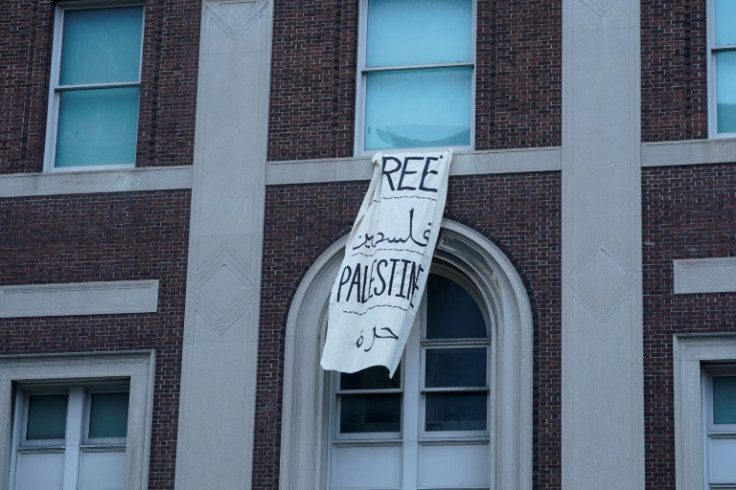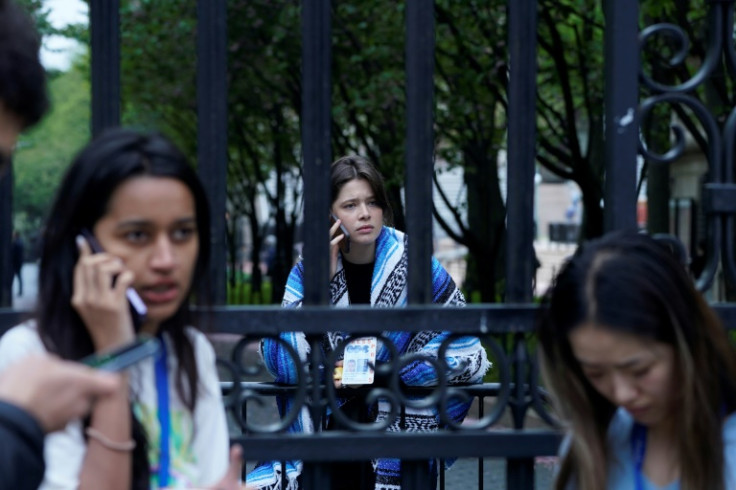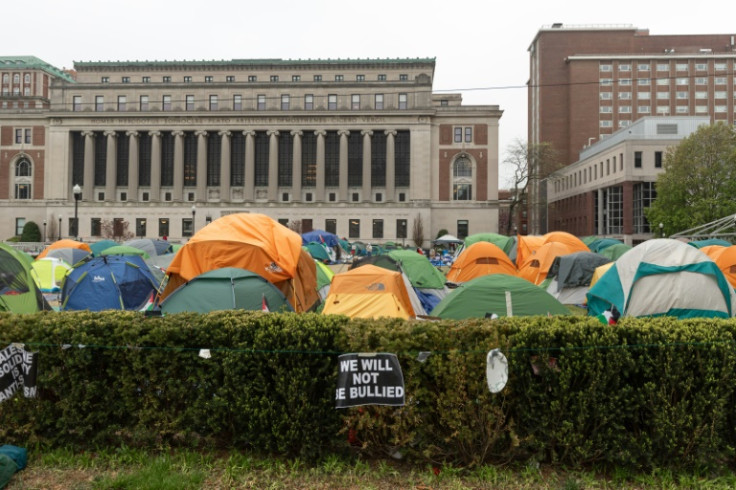At Columbia University, Students Weigh In On Surrounding Protests

Columbia University normally teems with students, but a "Free Palestine" banner now hangs from a building where young protesters have barricaded themselves and the few wandering through campus generally appear tense.
Students here were among the first to embrace the pro-Palestinian campus encampment movement, which has spread to a number of universities across the United States.
Despite Columbia's status as an epicenter of the student demos, the majority of its thousands of students are not camped out in tents, and have a variety of opinions on the matter, which has upended their spring semester.
With heated protests now having roiled his prestigious New York university for days, international student Naranjan Patkar believes "the campus should be open, and every student should feel safe inside the campus."
But as for the larger student protest and its cause, the 24-year-old from India told AFP: "I have no views on it."
Columbia has considerably restricted access, with only a single entrance for staff and students who reside on campus to pass through as of Tuesday. Meanwhile numerous police officers remained on guard.
Demonstrators who have barricaded themselves inside Hamilton Hall are vowing to remain until their demands are met, including that Columbia divest all financial holdings linked to Israel.
"You wake up in the morning and all you hear is helicopters and police sirens and hear about your classmates getting beaten up on or thrown in jail," said Mohamed Ali, a law student, who believes that the student body is being "collectively punished" so that it turns against the demonstrators.
"This is ridiculous and it's really inhumane," said the 24-year-old.
For Felipe Poelling, 19, "these are my fellow students that are doing these things and I think they know what they're fighting for, and I admire that."
"I have had a lot of family reach out to me concerned about safety and stuff like that, but I told them I'm not concerned," the first-year student told AFP.
Protests against Israel's war against Hamas in Gaza, with its high Palestinian civilian death toll, have posed a challenge to university administrators trying to balance free speech rights with complaints that the rallies have veered into anti-Semitism and hate.
Columbia University said Tuesday that students occupying the campus building face expulsion from their academic programs. A day earlier administrators began suspending students after they defied an ultimatum to disperse.
However the students inside barricaded Hamilton Hall have vowed not to leave and have called on supporters to demonstrate on campus -- or if barred, in front of the university.
David, a 19-year-old political science student, said he was divided on the matter and wants a halt to the "bloodshed that's occurred on both sides," referring to the Israel-Hamas war.
"In the United States... we have a cherished right to peaceably assemble that's established in our First Amendment" of the US Constitution, said David, who declined to give his last name.
But "you don't have a right to storm and riot and assault."
Tina Deng, who is studying economics, math and computer science at Columbia, said the situation is "causing a lot of inconvenience for many students," including lack of access to dining halls and libraries.
"It's hard to concentrate for the exams, you have to adapt," the 25-year-old told AFP, adding that while she didn't have an opinion, she hoped nobody is hurt and the issue can be resolved.
The Gaza war started when Hamas militants staged an unprecedented attack on Israel on October 7 that left around 1,170 people dead, mostly civilians, according to an AFP tally of Israeli official figures. Hamas also seized some 250 hostages.
Israel's retaliatory offensive has killed at least 34,535 people in Gaza, mostly women and children, according to the Hamas-run territory's health ministry.


© Copyright AFP 2025. All rights reserved.





















